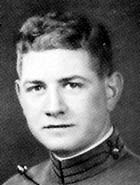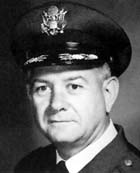Courtesy of his classmates, United States Military Academy:
Robert Edward Harrington
No. 13291 • 4 April 1918 – 20 September 1985
Died in Washington, DC, aged 67 years
Interment: Arlington National Cemetery, Arlington, Virginia
Robert Edward Harrington was born and raised in Postville, Iowa, the son of Cyrus Edward and Nina Gertrude Rush Harrington. A forefather had been among the founders of Postville, and the family had lived there ever since.
For his record in high school he won a scholarship to Cornell College in Iowa, where he became quarterback of the varsity football team. But during his second year there he realized a longtime goal and was appointed to West Point by his congressman.
The strong religious, civic, and family traditions instilled during his secure
middle-western boyhood imparted a legacy that would mark the rest of his life. Integrity, industry, personal responsibility, civic pride, and patriotism were his hallmarks. From this background it was an easy step to embrace Duty, Honor, and Country.
When Bob entered the academy, not only were his ideals and principles largely formed, but his personality and manner were much the same as they remained throughout his life. His ready smile, outgoing personality, love of people, and penchant for making friends were part and parcel of his nature. This congeniality, however, was not to be confused with softness; when the occasion demanded, he could be very firm and decisive.
While a cadet, Bob started his lifelong service to our class through membership on many class committees. A stalwart on F Company intramural squads, he was sure to be a leader in any informal activity, be it a water fight in summer camp or a football rally before the Notre Dame game. On the other hand, he worked hard and was anxious to succeed. He left West Point well known, well liked, and well prepared for future service.
Selecting infantry, Bob was assigned to Camp Hood, Texas, for tank destroyer training. While there, he renewed an acquaintance with Mary Virginia Hunt, whose family owned a department store in Dallas. They were married on 1 May 1943, and our class gained one of the finest young brides ever to “. . . join the Army, too.” Their marriage was the start of a 42-year partnership of friendship and love. They were blessed with four sons. The satisfaction and happiness of their life in the service is attested by the fact that three sons graduated from the Air Force Academy, and all are on active duty.
Bob and Ginny first set up housekeeping in Belton, Texas, near Fort Hood. With housing scarce, they shared a small garage apartment with classmate Flip Fenili and his new bride, Louise. But Bob yearned to fly, so he applied for transfer to the Army Air Corps. In September 1943, he reported for primary training at Tulsa, then Majors Field, Texas, for basic and to Foster Army Air Base, Texas, for advanced. In March 1944, he won his wings and in May was transferred to the Air
Corps, training in pursuit aircraft.
After six months of training in pursuit aircraft, he was assigned to the China-Burma-India Theatre and flew 30 combat missions in P-51 Mustangs, under General Chennault with the Fourteenth Air Force. While on a combat mission, he had to abandon his plane and parachute into the Japanese-Chinese No-Man’s Land of Central China. Thus started an adventure in escape and evasion, filled half with terror and half with comedy, but which ended happily with his safe return to friendly forces. Embellished with wit and humor, this adventure became the basis of a tale with which he would occasionally amuse close friends in his remaining years.
His first assignment after the war was as Chief of Foreign Installations Plans at USAF Headquarters. Bob played an active role in developing a worldwide network of bases to serve our new civil and military air fleets. He and Ginny moved to Arlington, along with Robert, who had been born while Bob was overseas. In Arlington, they established their first real family home; while there, they celebrated the birth of their second son, Richard.
In 1948, Bob was selected to attend the Air Command and Staff School at Maxwell; on graduation he was assigned to Strategic Air Command (SAC) Headquarters as Chief of the War Plans Branch. During the major expansion of SAC under General Lemay, Bob was an important member of the small staff that supervised buildup of one of the most effective military commands in history. They lived in Papillion, Nebraska, and it was there that their third son, Charles, was born.
In 1953, Bob was selected to be air attaché to Japan with a year of language training before reporting. Thus began assignment to intelligence duties, where he spent the rest of his active career. His ebullient personality, honesty, and diligence made him an instant success in Tokyo, not only with the Japanese and the Embassy but also with the attaché community, which he served as doyen during his final year. Already a 32nd Degree Mason, he found time to become a Shriner. He and Ginny traveled widely — both in Japan and up and down the Pacific littoral of Asia. In Japan, their fourth son, John Douglas, was born. For his service in Tokyo, Bob was awarded the Order of the Sacred Treasure in the name of the Emperor.
There followed intelligence assignments with the Joint Chiefs of Staff and the Defense Intelligence Agency (DIA). During this time, he also earned a master of arts in political science from the University of Maryland and membership in Pi Sigma Alpha, the national political science honor society.
In 1962, he attended the first class of the Inter-American Defense College and then was assigned as J-2 of the U.S. Southern Command in Panama. Four years later, he became Deputy Chief of Staff, Intelligence, for the Tactical Air Command, winning the Legion of Merit. In 1969, he was assigned as Deputy Chief of Staff, Intelligence, for the United States Air Force in Europe, where he won the Oak Leaf Cluster to his Legion of Merit. After serving as senior intelligence officer for three major commands, he returned to the U.S. and retired in 1972.
Bob and Ginny returned to a home in Arlington, Virginia, which they had long owned. Bob accepted a position as business manager for St. Agnes Episcopal School for Girls in Alexandria. There he served until a second retirement in 1981. In Arlington, Bob had become interested in local civic affairs and began dedicating much time and effort to helping the local government run more economically and efficiently. To those who knew Bob, it seemed only natural that in retirement he would choose to serve his community and his fellow citizens.
After retirement from St. Agnes, Bob devoted full time to civic and political interests. He was a member and later chairman of the Arlington County Civil Service Commission. He also chaired the County Compensation Review Panel. In addition to county work, he was a leader in independent and Republican political activities. He served on the Citizens’ Committee for Improving Local Government.
An outstanding son of West Point, a fine officer, a devoted husband and father, a dedicated American, Bob will be remembered as one of the true leaders of the Class of January 1943. He is survived by his widow, their four sons, his sister, and five grandchildren.
— A classmate
Michael Robert Patterson was born in Arlington and is the son of a former officer of the US Army. So it was no wonder that sooner or later his interests drew him to American history and especially to American military history. Many of his articles can be found on renowned portals like the New York Times, Washingtonpost or Wikipedia.
Reviewed by: Michael Howard


